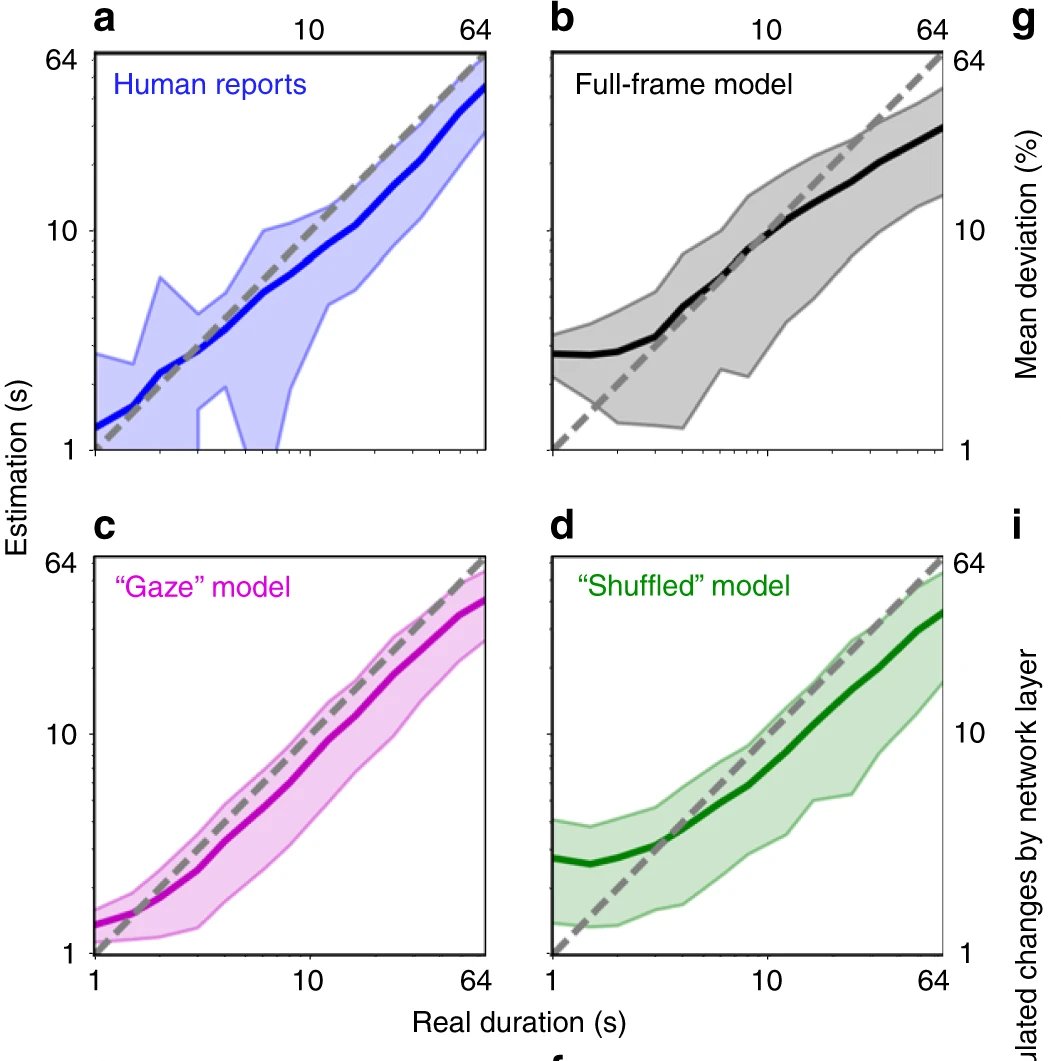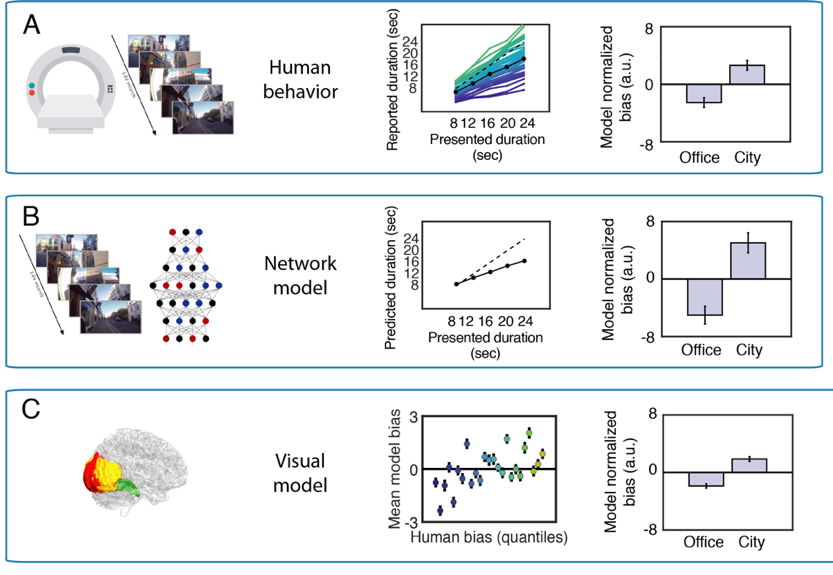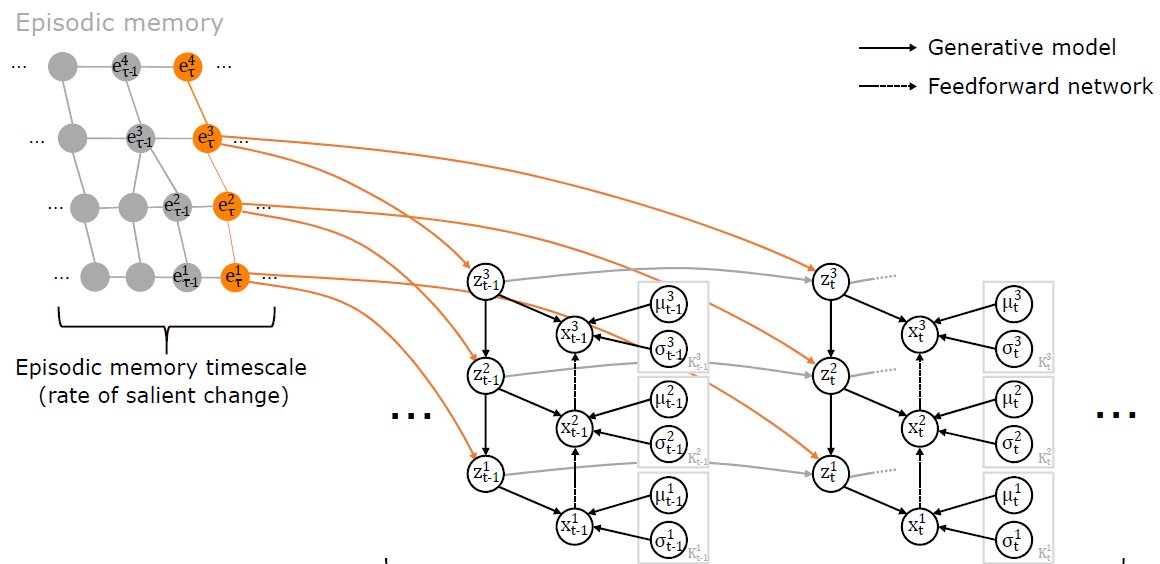We have been trying to push the idea that time perception is based on predictive processing in perceptual networks for a while. A short thread 1/n https://www.quantamagazine.org/reasons-revealed-for-the-brains-elastic-sense-of-time-20200924/">https://www.quantamagazine.org/reasons-r...
In a 2019 paper we used a simple algorithm to track the dynamics of an artificial neural network. To estimate “time” we measured the difference between network activations - a minimal naïve prediction error: 0 difference, the world hasn’t changed. 2/n https://www.nature.com/articles/s41467-018-08194-7">https://www.nature.com/articles/...
We showed that this approach could reproduce human time estimates for natural, first person videos, with the same pattern of biases as human observers. Especially the case when the input was constrained to approximate human viewing patterns. 3/n
It was suggested that this finding was trivial and reflected only our participants counting their eye movements while watching a video. We show that account isn’t true in a paper here: 4/n http://doi.org/10.1525/collabra.234">https://doi.org/10.1525/c...
The Nat Comms paper was based on an artificial network, rather than real, wet neurons, so arguments about biological plausibility always exist. So we tested our algorithmic approach on fMRI recorded while human participants watched first person videos. 5/n https://www.biorxiv.org/content/10.1101/2020.01.09.900423v4">https://www.biorxiv.org/content/1...
We were *extremely* rigorous, pre-registering our design & analysis pipeline for model-based fMRI analysis. At the time we didn’t know of anyone who had done so. As well known, experimenter degrees of freedom for fMRI analysis are very problematic. 6/n see https://www.nature.com/articles/s41586-020-2314-9">https://www.nature.com/articles/...
We found that based only on fMRI of participants’ brains while they watched natural, first person videos we could predict what their estimate of duration would be for each video. 7/n
Despite having never been done before, this paper has been rejected multiple times for being “trivial”. I thought it was quite an achievement given that time perception papers usually start with “the mechanisms of time perception remain unknown”... 8/n
Our work suggested that tracking dynamics in perceptual networks in terms of perceptual prediction error was a good route to understand subjective time perception. But we estimate time about things in the past based on memory and our models had no memory for previous content. 9/n
So we built a model of episodic memory and time perception. 10/n https://www.biorxiv.org/content/10.1101/2020.02.17.953133v1">https://www.biorxiv.org/content/1...
We tested the performance of our model against reports of duration of natural videos made by ~ 13 000 human participants. They made the judgements actively tracking time (prospective judgements) or without knowing to judge time until after (retrospective judgement). 12/n
The model reproduced characteristic features of the interaction between task (pro/retrospective) and the complexity of other things the participant needed to monitor while doing the task (cognitive load). 13/n
The neat thing about our work coming from time perception background and working with prediction error as the basis for our models was that it meshes neatly with “event segmentation” work in episodic memory. 14/n
e.g. https://doi.org/10.1016/j.neuron.2017.06.041">https://doi.org/10.1016/j...
e.g. https://doi.org/10.1016/j.neuron.2017.06.041">https://doi.org/10.1016/j...
We find it really interesting that by taking this alternative path to understand time perception, based in perceptual prediction error, we end up at the basic principles of how episodic memory is built. 15/n
We are working on linking these directions to understand how the basis of human subjective time perception in perceptual processing relates to memory in predictive coding terms – what content is remembered & recalled, what is attended to based on prior knowledge, etc. 16/n
Full credit to all the people who worked on these projects, notably: @zfountas, @maxine_sherman, Marta Suarez-Pinilla, @anilkseth and hopefully future related work to look out for from us and others @langestroop, @chrismbird 17/17

 Read on Twitter
Read on Twitter






